Ninja Gaiden is a media franchise based on action video games by Tecmo featuring the ninja Ryu Hayabusa as its protagonist. The series was originally known as Ninja Ryukenden in Japan. The word "gaiden" in the North American Ninja Gaiden title means "side story" in Japanese. The original arcade version, first two Nintendo Entertainment System games and Game Boy game were released as Shadow Warriors in PAL regions. As of 2008, the series has shipped over 7.7 million copies.
Dead or Alive (DOA) is a media franchise based on a fighting game series developed by Team Ninja and published by Tecmo. It is primarily composed of fast-paced fighting games that began with the original Dead or Alive in 1996. The series received critical and universal acclaim with the sequels Dead or Alive 2 in 1999 and Dead or Alive 3 in 2001, which are both considered landmark titles. Dead or Alive is the creation of Tomonobu Itagaki, who developed the first four installments but has since left the company and is no longer working on the series, which continues without him.

Teenage Mutant Ninja Turtles: Turtles in Time, released as Teenage Mutant Hero Turtles: Turtles in Time in Europe, is a beat 'em up arcade video game produced by Konami and released in 1991. A sequel to the original Teenage Mutant Ninja Turtles arcade game, it is a scrolling beat 'em up type game based mainly on the 1987 TMNT animated series. Originally an arcade game, Turtles in Time was ported to the Super Nintendo Entertainment System in 1992 under the title Teenage Mutant Ninja Turtles IV: Turtles in Time, continuing the numbering from the earlier Turtles games released on the original NES. That same year, a game that borrowed many elements, Teenage Mutant Ninja Turtles: The Hyperstone Heist, was released for the Sega Genesis.
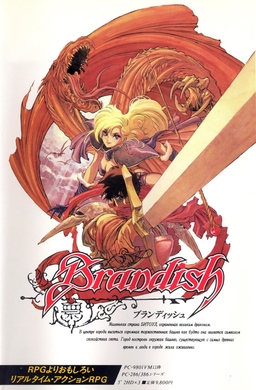
Brandish is an action role-playing game by Nihon Falcom. Originally released in 1991 for the NEC PC-9801 and FM Towns, it was later ported to the Super NES and PC Engine CD-ROM² in the mid 1990s, including an expanded re-release titled Brandish Renewal. The game was the first in the Brandish series and was followed by three sequels. A remake, Brandish: The Dark Revenant, was released for the PlayStation Portable in Japan in 2009 and worldwide in 2015.
A beat 'em up is a video game genre featuring hand-to-hand combat against a large number of opponents. Traditional beat 'em ups take place in scrolling, two-dimensional (2D) levels, while a number of modern games feature more open three-dimensional (3D) environments with yet larger numbers of enemies. The gameplay tends to follow arcade genre conventions, such as being simple to learn but difficult to master, and the combat system tends to be more highly developed than other side-scrolling action games. Two-player cooperative gameplay and multiple player characters are also hallmarks of the genre. Most of these games take place in urban settings and feature crime-fighting and revenge-based plots, though some games may employ historical, science fiction or fantasy themes.

Naruto: Rise of a Ninja is an action adventure game for the Xbox 360 with high emphasis on fighting and platforming mechanics, like with most Naruto games, it features cel-shaded graphics. The game was developed by Ubisoft Montreal, making it the first Naruto game to be developed by a non-Japanese company. The game is specifically based on the English dubbed version of the anime. The game was released in 2007. A sequel titled Naruto: The Broken Bond was released in the following year.

Dead or Alive 5 is a 2012 fighting game developed by Team Ninja and published by Tecmo Koei for the PlayStation 3 and Xbox 360. It is the fifth main entry in the Dead or Alive fighting series and the first to have a multi-platform release since Dead or Alive 2 as well as the series' first installment that was released for the PlayStation 3.

Kirby Super Star Ultra is an anthology platform video game developed by HAL Laboratory and published by Nintendo for the Nintendo DS in 2008. The game is an enhanced remake of Kirby Super Star, originally released for the Super Nintendo Entertainment System in 1996, to commemorate the Kirby series' 15th anniversary. The remake retains all game modes found in the original, and adds four major new ones, along with adding updated visuals and full-motion video cutscenes.
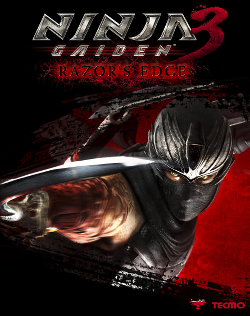
Ninja Gaiden 3: Razor's Edge is a 2012 action adventure hack and slash game developed by Team Ninja and published by Nintendo. It was released for the Wii U from November 2012 to May 2013, and subsequently released by Tecmo Koei for the PlayStation 3 and Xbox 360 in April 2013. It is an enhanced port of Ninja Gaiden 3 that includes all downloadable content from the original title, as well as additional enhancements made to improve the game. The game can be considered an equivalent to the Ninja Gaiden Sigma games, as it makes several changes to the original title.
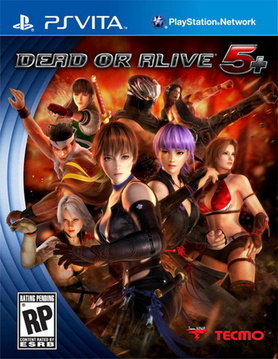
Dead or Alive 5 Plus is a fighting game in the Dead or Alive series, developed by Team Ninja and released by Tecmo Koei for the PlayStation Vita in March 2013. An expanded handheld port of the 2012 game Dead or Alive 5, DOA5+ was met with positive critical reception, gaining better scores than the original.

Dead or Alive 5 Ultimate is a fighting game in the Dead or Alive series, developed by Team Ninja, and released by Tecmo Koei for the PlayStation 3 and Xbox 360 in September 2013. It was followed by an Arcade edition later in 2013. It is the first arcade game to be released by Koei Tecmo since Dead or Alive 2 Millenium in 2000.
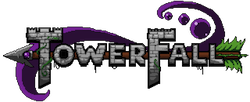
TowerFall is an action indie video game created by Maddy Thorson through her company Maddy Makes Games. In the game, players control up to four archers in a multiplayer platform fighter. It was released on the Ouya microconsole in June 2013 and was later ported to PlayStation 4, Xbox One, Linux, OS X, and Windows as TowerFall Ascension and to the Nintendo Switch under its original title of TowerFall.

Basement Crawl is an action game for PlayStation 4. It was released on February 25, 2014.

Strider, known in Japan as Strider Hiryū, is a platform-adventure hack and slash video game developed by Double Helix Games and Capcom's Osaka studio. It was released in February 2014 for PlayStation 3, PlayStation 4, Windows, Xbox 360, and Xbox One. It is a reboot of the 1989 video game Strider.

Alien Rage is a 2013 first-person shooter video game for Microsoft Windows, Xbox 360, and PlayStation 3 developed by CI Games, then known as City Interactive, using Unreal Engine 3. The game has single-player and competitive multiplayer modes. In its single player campaign, players are put in control of an elite soldier named Jack which is sent to destroy a mining facility and its aliens after they turned against and killed the humans that they had shared the facility with.
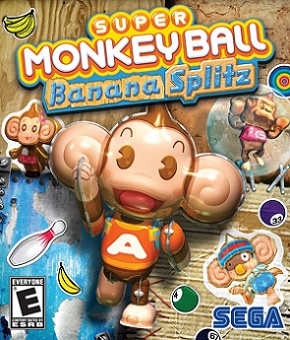
Super Monkey Ball: Banana Splitz is a platform video game developed by Marvelous AQL and published by Sega for the PlayStation Vita. Similar to other entries in the Super Monkey Ball series, the game involves the player directing a monkey encased in a sphere through an obstacle course to a gate at the end of the level. The game was released early on in the Vita's lifespan, in June 2012 in Japan, and in October in Western regions. Reviewers were mixed on the game's merits; while some appreciated the game's core gameplay, others felt it was too redundant to prior entries. The game did not perform well commercially, and was the last completely original entry in the series to be released on a dedicated video game console with the game's core gameplay mechanics, with the next entry, Super Monkey Ball Bounce, playing as a Peggle pachinko clone on mobile devices instead and subsequent entries thus far being remakes of past titles.

Videoball is a minimalist sports video game by Action Button Entertainment. Up to six human and computer-controlled players form two teams. Each uses an analog stick and a single button to control triangles that shoot charged projectiles at a ball and other players. The objective is to knock the ball into the opposing team's goal. Apart from exhibition matches, the game has a scenario challenge-based Arcade mode, and supports online team and ranked multiplayer matchmaking. Videoball has a simple visual style with bright colors, basic shapes, and many customization options.

Duck Game is a 2D action game developed by Landon Podbielski and published by Adult Swim Games. The game was released for the Ouya in 2014, and for Microsoft Windows in 2015. A PlayStation 4 version was released in August 2017, and a Nintendo Switch version was released in May 2019. A major update was released in November 2020 on PC, with an upcoming release on the Switch.

Teenage Mutant Ninja Turtles: Mutants in Manhattan is an action hack and slash video game developed by PlatinumGames and published by Activision. It is inspired by IDW Publishing's Teenage Mutant Ninja Turtles comic book series. It was released for PlayStation 3, PlayStation 4, Windows, Xbox 360, and Xbox One on May 24, 2016. Less than eight months after its release, the game was removed from sale from all digital storefronts on January 3, 2017. This was the last Nickelodeon game to be published by Activision, with the rights for the Teenage Mutant Ninja Turtles video game series being given to Dotemu.
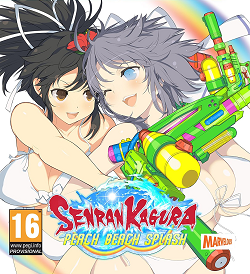
Senran Kagura: Peach Beach Splash is a third-person shooting game in the Senran Kagura series, published by Marvelous and developed by Tamsoft. It was released for PlayStation 4 on March 16, 2017, in Japan, and on September 26, 2017, in North America, Europe and Australia. A Microsoft Windows version was released worldwide on March 7, 2018.

















